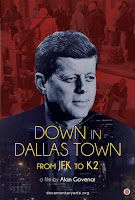the traveler's resource guide to festivals & films
a FestivalTravelNetwork.com site
part of Insider Media llc.
Reviews
Juilliard Orchestra Perform at Lincoln Center
- Details
- Parent Category: Film and the Arts
- Category: Reviews
- Published on Tuesday, 05 December 2023 14:45
- Written by Jack Angstreich

Thomas Wilkins conducts Juilliard Orchestra, photo by Claudio Papapietro
At Lincoln Center’s Alice Tully Hall on the evening of Monday, November 20th, I had the wonderful opportunity to attend a superb concert featuring the excellent musicians of the Juilliard Orchestra, here under the impressive direction of Thomas Wilkins.
The program began auspiciously with a thoroughly engaging account of George Gershwin’s marvelous, enormously popular An American in Paris from 1928.The composer commented interestingly upon it that, “if it pleases symphony audiences as a light, jolly piece, a series of impressions musically expressed, it succeeds.”
Four admirable soloists—Paige Quillen, Carys Sutherland, Emily Howell, and Colby Kleven—then took the stage for a pleasurable rendition of Robert Schumann’s fine, too seldom performed Konzertstück for Four Horns and Orchestra in F Major, Op. 86, from 1849, played here in the early 2000s arrangement by Kerry Turner which, in the program note by Sutherland, is described as “audibly indistinguishable from the original for the audience,” adding:
Schumann’s original manuscript gives nearly every virtuosic passage to only the first horn, with the other players mostly serving as backup harmony. This arrangement divides the high passages between the first and second horns, and the third and fourth horns dazzle in the Romance while the first two take a much-needed rest. The overall result is that the players are equally involved technically and melodically, making this truly a four-horn concerto.
The spirited initial movement has a Mendelssohnian quality that persists throughout the work as a whole, while the slower Romance that follows is contrastingly elevated and the very fastfinaleis exuberant and propulsive, returning to something closer to theethosof the first movement. The artists earned vigorous applause.
The second half of the event was even stronger, a sterling realization of Florence Price’s extraordinary, recently rediscovered Symphony No. 3 in C Minor from 1940, which reverts to an approach involving popular idioms that is closer to that which characterizes An American in Paris. The opening Allegro—which has a solemn, Andante introduction—is frequently boisterous—but with echoes of Gershwin and Aaron Copland that can seemingly be discerned elsewhere in the piece as well—and ends abruptly. The ensuing movement, marked Andante ma non troppo, is more inward in orientation while the buoyant and playful third movement is anAllegrowith some placid moments that iscast in the form of thejuba,explained by the annotator as:
...a style of dance originating from Kongo slaves in the pre-Civil War South. Because drums were forbidden on many plantations, the dance involved clapping and stomping, and may be the origin of modern tap dance...
Thefinale—aScherzo—is ebullient with dramatic passages and closes powerfully. The performers were rewarded with an enthusiastic ovation.
Off-Broadway Play Review—David Adjmi’s “Stereophonic”
- Details
- Parent Category: Film and the Arts
- Category: Reviews
- Published on Monday, 04 December 2023 23:33
- Written by Kevin Filipski
.jpg) |
| The cast of Stereophonic (photo: Cherice Parry) |
Armenian National Philharmonic Orchestra Plays Carnegie Hall, Presented by CLASSIC MUSIC TV
- Details
- Parent Category: Film and the Arts
- Category: Reviews
- Published on Monday, 04 December 2023 14:22
- Written by Jack Angstreich

Photo from Classic Music TV.
At Carnegie Hall, on the evening of Wednesday, November 15th, I had the pleasure of attending a splendid concert—presented by Classic Music TV—featuring the Armenian National Philharmonic Orchestra under the distinguished direction of Edward Tophjan.
The program opened brilliantly with an exhilarating realization of three magnificent selections from the celebrated 1953 ballet score, Spartacus, by the Armenian composer Aram Khachaturian—this year is the 120th anniversary of his birth. The first excerpt, “Variations of Aegina and Bacchanalia,” is sparkling and dynamic, while the second, “Adagio of Spartacus and Phrygia,” begins lyrically but builds to a more emphatic statement, concluding serenely. The final section, “Dance of Gaditanian Maidens and Victory of Spartacus,” is evocative and mysterious, increasing in excitement and appropriately closes triumphantly.
An admirable soloist, Sergey Khachatryan, then joined the artists for an impressive account of the same composer’s Violin Concerto in D minor from 1940—a work that, like the music for Spartacus, deserves a more prominent place in the repertory. The initial, ambitious Allegro con fermezza is energetic—even agitated at times—but with meditative moments and it has both an exotic quality as well as, especially in the cadenza,avant-gardeelements. The Andante sostenuto that follows is reflective and melodic—seemingly with Eastern folk motifs—but is not without intensity and ends quietly. The Allegro vivace that completes the piece is restless, even turbulent at times, but with sprightly passages and it finishes dramatically.
The second half of the event was also memorable, comprised of a compelling rendition of the marvelous Symphony No. 2 of Sergei Rachmaninoff, whose sesquicentennial anniversary is also this year. The main body—marked Allegro moderato—of the complex first movement—which has a solemn, Largo introduction that becomes more soulful—has a largely passionate, even urgent, character but sometimes is almost bucolic and the Allegro molto that succeeds it is propulsive, playful and suspenseful but with emotional passages. The famous, haunting primary theme of the Adagio that ensues is impossibly beautiful while the Allegro vivace finale is exuberant with some subdued episodes. A very enthusiastic ovation was rewarded with a delightful encore: the famous Waltz from the 1944 Suite drawn from the incidental music Khachaturian wrote for the Mikhail Lermontov play,Masquerade.
November '23 Digital Week III
- Details
- Parent Category: Film and the Arts
- Category: Reviews
- Published on Friday, 01 December 2023 02:46
- Written by Kevin Filipski
More Articles...
Newsletter Sign Up















